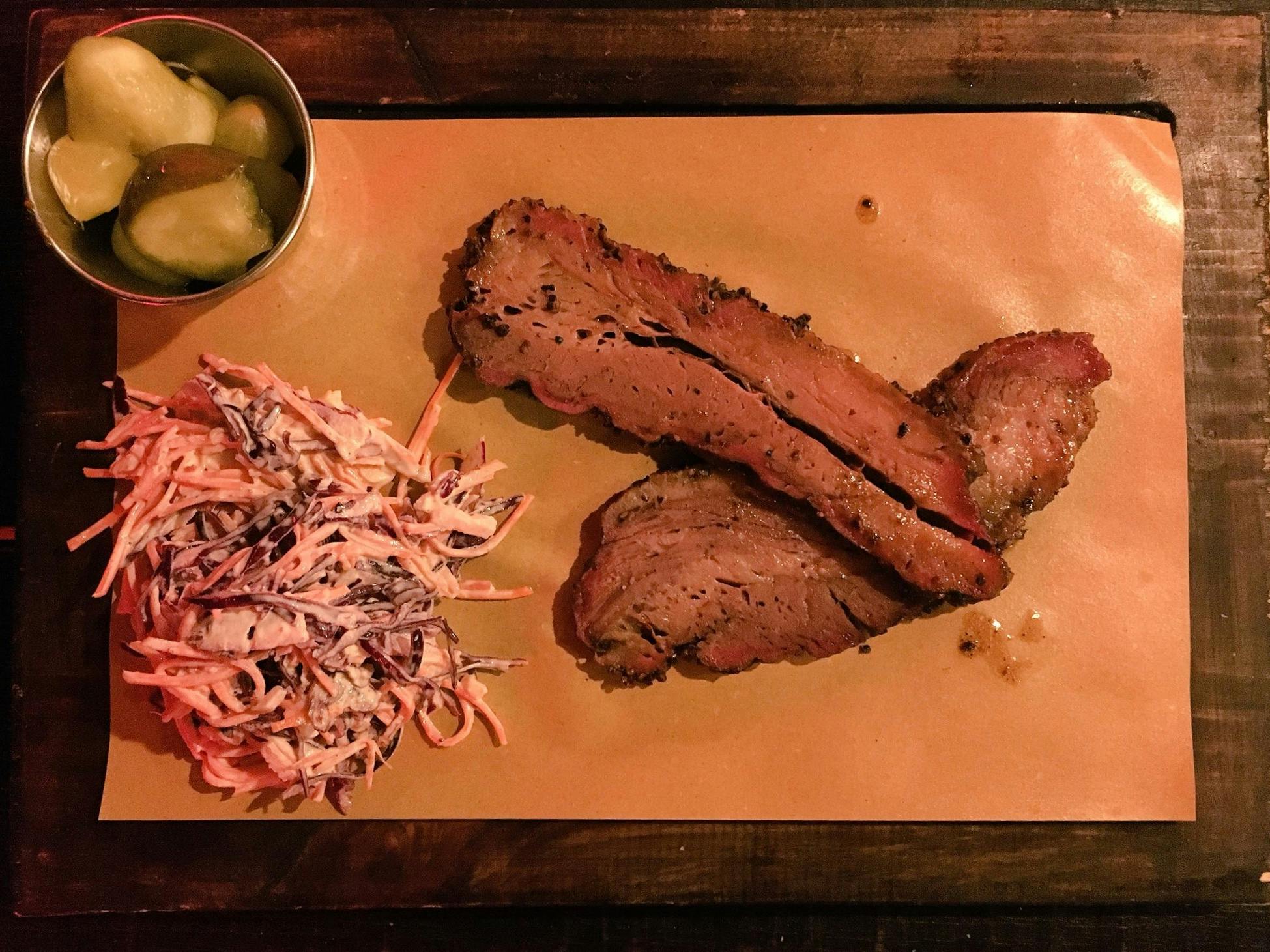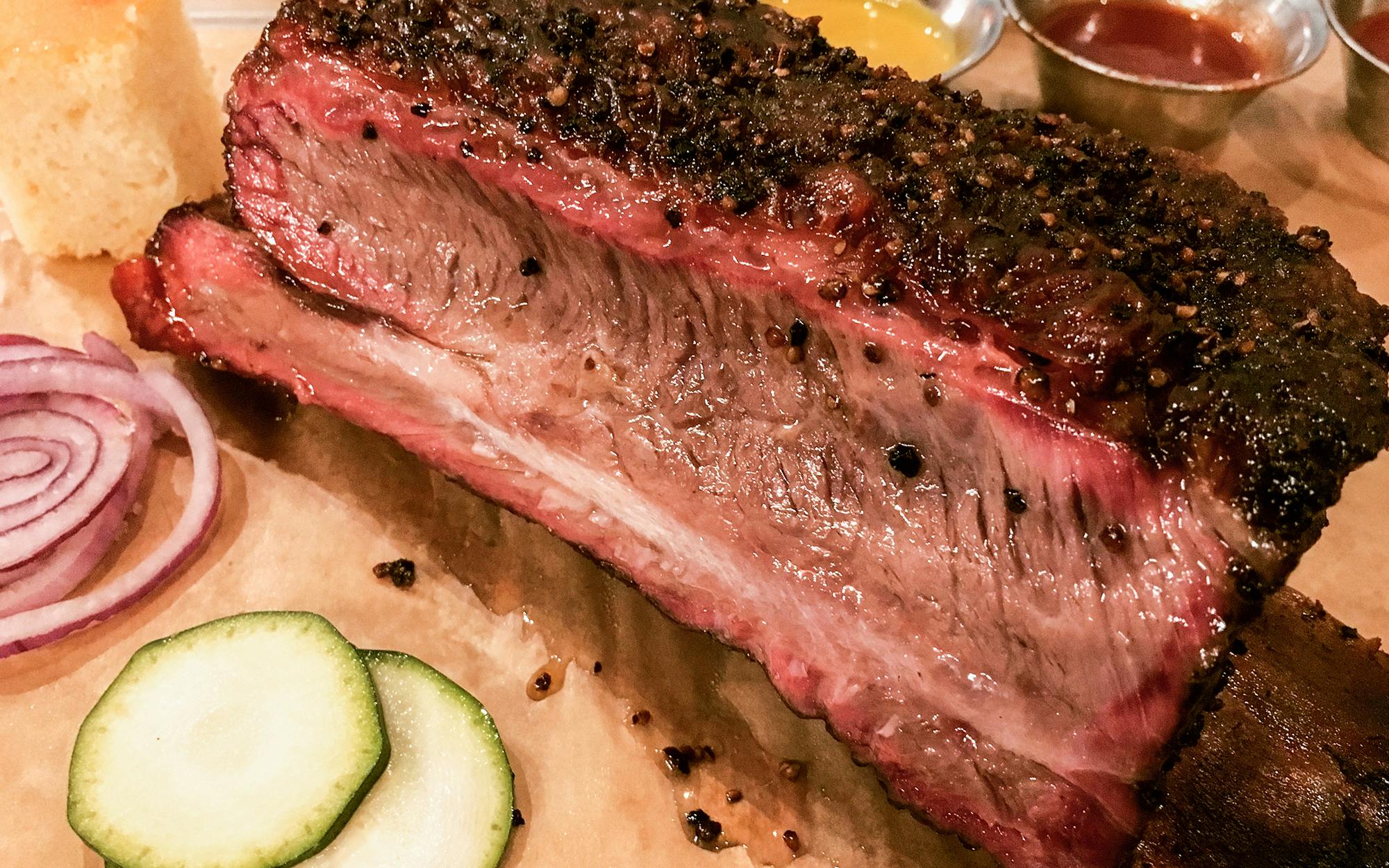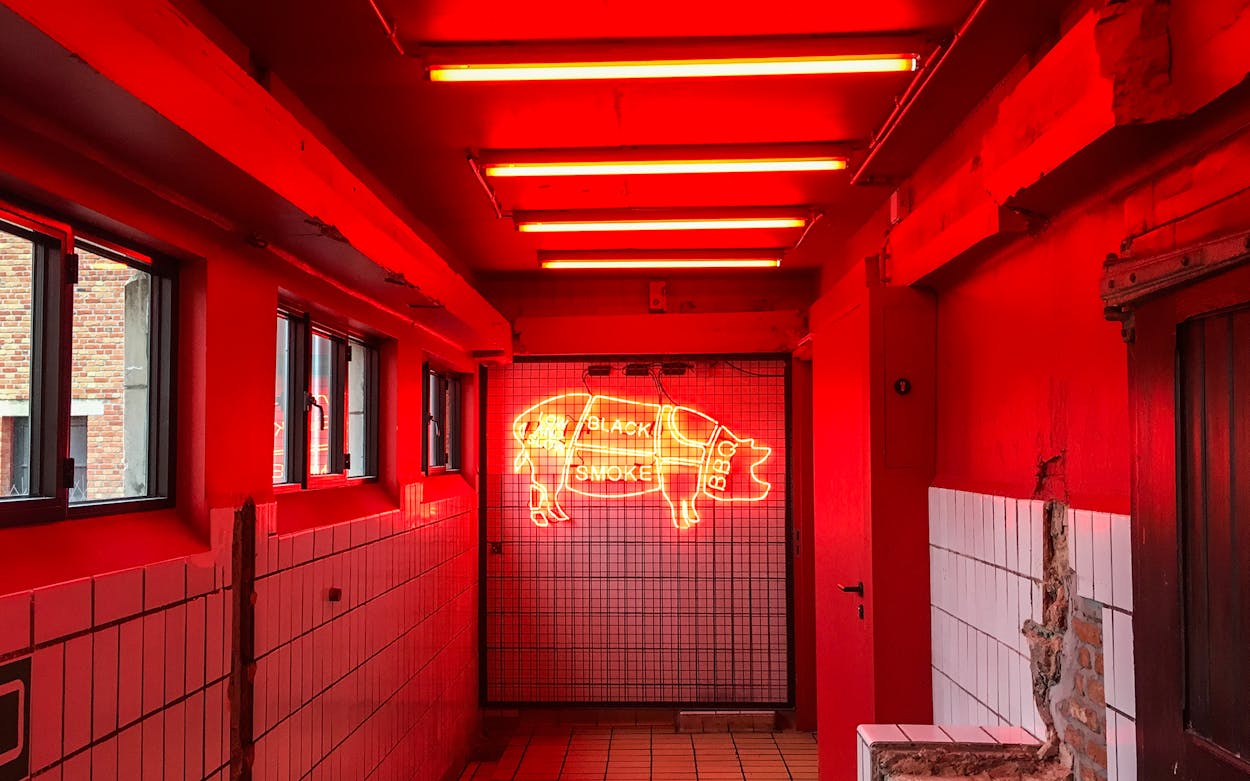My family and I went to Belgium looking for waffles, chocolate, and beer—and we found plenty. But, as they’ve come to expect when traveling with me, we also found barbecue. And as I’ve come to expect in major cities across the world, Texas barbecue specifically was represented. Brisket was the centerpiece of the menu at both Black Smoke in Antwerp and Holy Smoke in Brussels, but the two restaurants couldn’t have been more different.
The elevator was broken in the tower that houses Black Smoke. That’s a tough break for the rooftop bar patrons, but the restaurant is on level three (European for the fourth floor). After days of rapid consumption of chocolate and frites dipped in mayo, a bit of stair climbing wasn’t a bad idea anyway. And so we hiked up to the “rock-your-socks-off BBQ experience” that was awaiting us, according to the online menu I’d researched the night before.
Entering into the restaurant, you pass through a doorway covered in heavy plastic strips, like the kind at the entrance of a meat cooler, and make your way through a long hall covered in white tiles and lit with red fluorescent lights. It felt straight out of a Tarantino film. The snout of a red neon pig pointed toward the restaurant’s interior, where a double-height glass wall provided an unobstructed view into the kitchen. They wanted to show off the wood-fired grill, but my focus drifted to the end of the counter where meats were reheated under a broiler before being placed on trays for service. The brisket wasn’t exactly fresh from the smoker.

After the visit, I messaged Black Smoke co-founder Jord Althuizen to ask about the restaurant’s cooking process. He said that after many visits to American barbecue joints, he preferred the peppery seasonings of Texas brisket. The menu even names checks “Louis Mueller,” from Louie Mueller Barbecue in Taylor, as the inspiration behind their nine-to-one pepper-to-salt rub. Althuizen said he wished that his restaurant could operate like a Texas-style barbecue joint—mostly serving the meat fresh from the smoker—but said an overnight cooking staff wasn’t feasible. “Unfortunately running a restaurant business in Belgium provides certain challenges that make this near impossible if you want to make a profitable business,” Althuizen said. Black Smoke’s method of chilling down meat and then reheating it under the broiler made for oddly textured brisket slices and a rather dry half-rack of pork ribs, which were reheated under the broilers for the lunch crowd. Maybe dinner would have been better, but reservations were required, and they were booked for the evening.
Pastrami has become a popular item at Texas smokehouses, so I was intrigued to see house-cured pastrami as a special. Thin strips of cured brisket flat came out cold on a board. It was hard to taste anything but for the sugary rub with crunchy bits of black salt that was sprinkled generously on top. Served with sweet pickles on the side, the pastrami, I think, was lost in translation.
There were a few bright spots. The roasted sweet potato with smoked butter was nice, and I appreciated the creativity of the smoked eggplant with almonds. You’ll have to bring a child along to order the best item we tried, which were the crisp chicken wings on the twelve-and-under menu. We didn’t bother with dessert, though I couldn’t help but notice the American Coffee D-Luxe after-dinner cocktail promised to be “every American’s wet dream.” That played directly into the over-the-top barbe-chismo theme, which included napkins printed with instructions to wipe the “bullshit” off your lips and onesies for sale that announced “my dad is the real motherfucker around here.” It was time to go.
I’d twice asked for the check, but before the staff would bring it, they all but commanded I take the leftovers. “It’d be a shame to waste food,” they said handing me two paper bags for take-away (that’s European for to-go). But my reason for not taking the food wasn’t about the inconvenience. It was just bad barbecue, and I didn’t want to relive the experience with a reheated (yet again) version. Still, we stuffed the bags, and signed the check. I waved off a third bag meant for eh half-eaten nachos and scurried to the exit, bounding down the four flights of stairs. I wandered into a chocolate shop while my wife, holding two paper bags of unwanted barbecue, looked for a trash can.
Brussels is just a forty minute train ride south from Antwerp, but their version of Texas barbecue was a world away. The only similarity between the experiences at Black Smoke and at Holy Smoke in Brussels was the strict reservation policy. It’s hard to just pop in for a decent meal in Belgium without booking a table first. The four of us showed up right at opening time, pleaded our case as Texans in need of smoked beef, and they found us a table.
We didn’t have to wonder what equipment they were using. An Oyler rotisserie smoker is on display in the front window for any passers by on the sidewalk. Neon lights read “You love meat…we smoke it!” To get to the compact dining area, you walk past the cutting block where trays of barbecue are being prepared. There’s also a handsome bar with wall of backlit bourbon and rye bottles from the U.S. The pairing of bourbon and barbecue runs deeper than just de facto Americana symbols for owners Gabriel Ejzenbaum and Agatha Legrand—it represents a story of American cuisines the isn’t often told in Europe. “For Europeans, American food is like junk food, and for us it is so much more,” Legrand said. Holy Smoke is their way of sharing what they love about American food and educating their customers about our culinary craftsmanship.

They started the business two years ago when Ejzenbaum graduated from a Weber smoker—which he learned practiced with in his parents’ backyard in France—to an offset smoker. He and Legrand (also French) both loved Brussels, so they moved together and started hauling the smoker around. Early customers were as confused by the smoke-belting contraption as they were by the smoked meats—they thought barbecue simply grilled meat. Ejzenbaum and Legrand were teaching Belgians about Texas barbecue as fast as they were learning from Aaron Franklin’s online videos. Ejzenbaum told me about their travels to Texas for barbecue, and he didn’t hesitate when I asked his favorite. “Franklin,” he said. “That’s the best barbecue I’ve ever eaten.”
When the couple decided to get a permanent spot, they talked with Thomas Abramowicz at the Beast in Paris. He pointed them to the Oyler smoker, so they had one shipped over from Mesquite, Texas. It took months to renovate their current building, and explaining what a smoker was to the local code officials was a considerable challenge. They finally opened in early November of this year.
Despite French being the language in Brussels, the barbecue items on the menu are all in English. “We wanted people to get used to the American words,” Legrand explained. They also want them to get used to American brisket, which is shipped in from Creekstone in Kansas. The slices on the “meat porn” platter (you can do better than that, y’all) were drier than I’d like, but the smoke flavor was there, as well as the pungency of freshly cracked black pepper. An enormous beef short rib had the same seasoning, but a grassier flavor in the fat. This slightly gamey beef came from Scotland, and paired well with the mustard sauce.
They offer three sauces at Holy Smoke, all on the side, but the mustard was the only one I cared for. The pulled pork came dredged in one of the sweeter, tomato-based sauces, which was a shame. For pork, definitely go with the thick cut ribs. They’re smokey, tender, and meaty. No sauce required. A favorite of the table was the smoked sausage link. The looped link, made to Holy Smoke’s recipe by a butcher in Antwerp, has the look of a Central Texas sausage, but one bite tells you the flavors are all local. Along with garlic and fennel, there’s an acidic tang from confit lemons. We fought over the last bite.
Legrand said the barbecues all Texas-influenced but that “the side dishes are more personal.” It’s where they show off the flavors of Brussels. After days of eating Belgian frites, the tender potatoes, cooked confit in smoked butter, were a welcome change. A special of butternut squash with cream and sesame seeds was nice on a chilly night.
Even with such a young business, Holy Smoke is already popular with the locals. “We are lucky,” Ejzenbaum said, noting that the place is full every night. Thankfully, the diners here can get a real taste what Texas barbecue is meant to be (and lucky for them they can also pair it with great Belgian beers). When I asked the pair if they can explain how Texas barbecue has been so well received in such a young restaurant in Brussels, Ejzenbaum simply explained, “I think people are very curious, and they like meat.”








